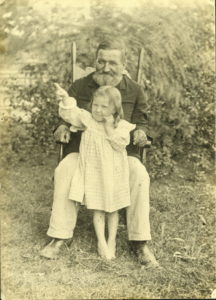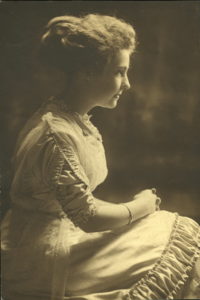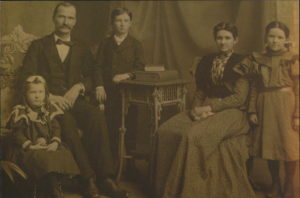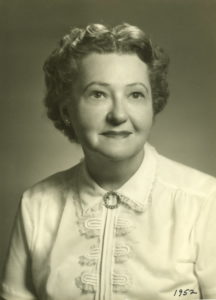Ruth recalls when “a monster came to town, in the form of a red automobile.” The first car in Boonville spooked horses, and caused some furor among farmers who needed to transport goods and themselves by horse-drawn wagons. People had to telephone the owners of the car to see when it would be out on the street, so they could plan their own outings accordingly.
Ruth Gough Wilson was born on September 20, 1892, in Boonville, Indiana, population about 2,000 at the time she was born. Ruth’s father owned a dry goods store on the northeast corner of the town square, so the family lived comfortably. She had an older brother Robert, and an older sister Helen, who died at age 18 of tuberculosis after a year-long illness. It was a painful loss for Ruth: she and Helen were best friends. The two had shared a bedroom and double bed growing up; remarkably, Ruth never developed clinical TB.

Robert Gough ca 1897
Ruth recalled scenes from her childhood in her memoires:
“We had oil lamps for lighting, no indoor plumbing. We had a pump in the kitchen to pump water from a well in the yard. A big zinc tub was brought into the kitchen for our baths. For heating and cooking we used coal and wood stoves and fireplaces. Our laundry was done on a wash board, in the same tubs we used for baths. The ironing was done with the old iron irons, which we see in antique shops now. You can imagine how busy our poor mothers and fathers were especially our mothers; cooking, washing, ironing. There were no ready made clothes then, so our mothers had to make all of our clothes. Our fathers were busy earning a living. They had no time for outside interests, except church, prayer meetings, and Ladies Aid. Of course they took us with them to these activities, since no one had heard of a baby sitter then.
“We all needed one another and worked and loved and played together. Our mothers had scant help, hired girls off and on. In the winter time, girls who were not needed on the farm wanted to come in town and see what city life was all about. They mostly worked for their board and two or two and a half dollars a week.
“What did we care about conveniences and luxuries? Our home was filled with warmth and love. We had a wonderful mother and father. Remember there were no radios, TVs’s, etc., so we had to make our own fun and games. We popped corn, made taffy and molasses candy. I do seem to remember a set of dominoes and checkers. In the spring time we would pick great bunches of violets from an adjacent field. Before Memorial Day we would go out to the daisy field and pick bushels of them. My mother and Aunt Mary would decorate all of the family graves, plus others that looked neglected. Maybe that accounts for my fondness for violets and daisies down through the years.

“The big events were visits from our cousins, and the ones to their homes, usually after Sunday school and church, and on holidays. We didn’t seem to have girl and boy friends, just cousins. I remember one Sunday when our Uncle Jim Wilson and family were at our home, my brother and cousin were missing too long. Their dads found them in the barn stuffing our cow “Old Rony” with hay. It seemed they had heard some concern expressed over her being too thin. They were two pretty scared little boys; she had eaten all she could, and was lying down. Their alibis were that they were trying to feed old Rony. My father called the horse doctor; we had no veterinarians. I don’t know what he did, but he pulled her through. For a time it looked as if our milk supply was threatened. The horse doctor said she had had a case of foundering.
“When I started to school, in the first grade, oddly enough I went to the same teacher my father had gone to, Miss Ella Williams. She was quite an institution, and one of the schools still bears her name. Miss Ella was a very large lady, and my father told me that if I didn’t behave myself, Miss Ella would sit on me. I wasn’t taking any chances, so I went merrily on my way, with a pin stuck in my dress to be on the safe side.
“A favorite place to play was up at our Uncle Edward’s (Gough) home. They had a beautiful big brick ivy covered house, with extensive grounds. There was a hill, which we coasted down in the winter. There was a little brook running through the lower yard, where we fished. We fished for crayfish, “Craw Dads” we called them. We would cut branches from the trees, tie strings on them, put bent pins on the end, and bait them with bacon. We seemed to have no trouble getting our catch. We put them in tin cans, took them home to feed to the chickens.
“There was a clay tennis court, and a saw dust croquet ground. Across the street was more Gough property with a pond, where we skated in the winter.

“This next was a very poignant period in my life. My dear sister, Helen died on Good Friday, March 30th, 1907. She and I were two years apart, and very close. We had many of the same friends, did many things together. We shared a room, double bed, also many ideas, secrets etc. as young girls are apt to do.
“When she was seventeen years old, during the summer, she seemed tired, nothing special. it was a very subtle thing, and we probably wouldn’t have noticed it so soon, except that we had a nurse in our home who was taking care of my mother, who had typhoid fever. She advised dad to take Helen to our family doctor. He, in turn, sent them to a lung specialist, who said that Helen had tuberculosis, and that it was very advanced, and at that stage, incurable, and that she only had a few months to live. It was a terrible shock, and hard to believe, because at that time, it was thought to be hereditary, and my parents knew of none on either side of the family. We were a very sad little family, especially me, when I learned that I would lose my beloved sister, and my best friend.
“In November, when the wintry weather started, my parents, grasping at any hope, decided to take Helen to Florida – somehow hoping the Florida sunshine would effect a cure. My brother was left at home with relatives, but I went along. I had to leave my school, freshman in high school, maybe sophomore, I’m not sure. Our time in Florida was uncertain, naturally all attention was focused on Helen, so no one thought of my entering a school, temporarily. I just stayed around Helen, keeping her company, and trying to keep her spirits up.
“We stayed in Florida until March, when the doctor told us that her time was very short, and if we wanted to get her home alive, we had better go. We were only home about two weeks when she died.
“She was conscious almost to the very last, and smiled at me when I put a bunch of lilacs on her bed. She saw our tears, and said, “Don’t worry, God will take care of me.” I’m sure He did and still is. The end came then, with a hemorrhage. Even in my grief, it was truly a spiritual experience.”
Ruth graduated high school and went on to one year of music school in Indiannapolis before returning to Boonville, where she met her future husband, Thomas C. Mullins, a coal and oil consultant out of Chicago who was based in Boonville for a few years. The two were married in 1918, the day before Mullins shipped off to World War I in the Army Corps of Engineers. The exciting story of their rushed marriage and Mullins’s deployment is related in War & Romance!

Ruth finally left Boonville when the Mullins family moved to Chicago in 1927, where she would live and raise her family for the next 30 years. In 1954 she lost her husband after a long illness with an aortic aneurysm. She remarried to an old friend, Charles Buford, and moved to Florida. She was widowed once again 4 years later.
Ruth lived a long life as the Mullins family matriarch, celebrating the birth of many grandchildren and great grandchildren. She remained in good health and sound mind until the end, an expert Scrabble player. She was a warm, kind, important and central figure to all in her family. On her final day of life, she felt a bit ill, and went to the health center at her living complex. She was lying in bed watching “Jeopardy”, and decided to try to sit up. A friend at the bedside said, “The doctor told you not to sit up.” Ruth replied, “That’s silly!” With that declaration, she left this life suddenly and peacefully, at the age of 103 1/2.
© 2013 W. Mullins
